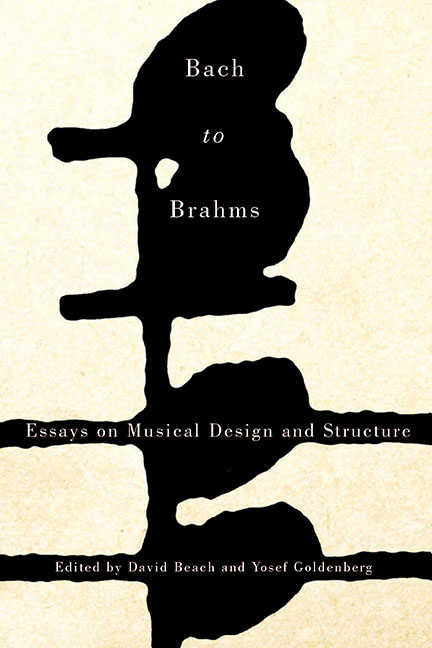Book contents
- Frontmatter
- Dedication
- Contents
- Introduction
- Part One Structure and Design
- Part Two Focus on Motive
- 5 Chopin as an Interpreter of Mozart: The Variations Opus 2 and Don Giovanni
- 6 The First Movement of Brahms's Fourth Symphony Revisited: A Study of the Fanfare and the “Cloud of Mystery”
- 7 “Capricious Play”: Veiled Cyclic Relations in Brahms's Ballades Op. 10 and Fantasies Op. 116
- 8 Chopin's Study in Syncopation
- 9 A Sharp Practice, A Natural Alternative: The Transition into the Recapitulation in the First Movement of Beethoven's “Hammerklavier” Sonata
- 10 Ernst Oster's Vision of Hidden Repetitions and Motivic Enlargements in J. S. Bach's Short Keyboard Works
- Part Three Structure and Design II
- List of Contributors
- Index
10 - Ernst Oster's Vision of Hidden Repetitions and Motivic Enlargements in J. S. Bach's Short Keyboard Works
from Part Two - Focus on Motive
Published online by Cambridge University Press: 14 March 2018
- Frontmatter
- Dedication
- Contents
- Introduction
- Part One Structure and Design
- Part Two Focus on Motive
- 5 Chopin as an Interpreter of Mozart: The Variations Opus 2 and Don Giovanni
- 6 The First Movement of Brahms's Fourth Symphony Revisited: A Study of the Fanfare and the “Cloud of Mystery”
- 7 “Capricious Play”: Veiled Cyclic Relations in Brahms's Ballades Op. 10 and Fantasies Op. 116
- 8 Chopin's Study in Syncopation
- 9 A Sharp Practice, A Natural Alternative: The Transition into the Recapitulation in the First Movement of Beethoven's “Hammerklavier” Sonata
- 10 Ernst Oster's Vision of Hidden Repetitions and Motivic Enlargements in J. S. Bach's Short Keyboard Works
- Part Three Structure and Design II
- List of Contributors
- Index
Summary
I vividly recall the morning when, early during my student days at the Mannes College of Music (now Mannes College the New School for Music), I ran into Ernst Oster as he crossed Central Park on the way to school. As we were chatting, I asked him (with a good deal of the young student's naiveté) what it was like to study with Oswald Jonas. After a few moments’ hesitation—would a fledgling understand his response?—Oster replied, “He showed me the meaning of artistic interpretation.”
As my analytical studies progressed (I was enrolled in Oster's classes and also sat in on as many as time and scheduling allowed), it became evident that Jonas's cultivation of the artistic observation—as apposed to mere drills in voice-leading reduction—stood at the core of Oster's teaching as well. Oster's phenomenally precise ear for contrapuntal, motivic, and rhythmic detail notwithstanding, his aim at even the most elementary level was to present much more than an accurate reading of a piece. It was to stir the student toward a discovery of the composition's creative gist, its guiding tonal idea. Ultimately, Oster insisted, this discovery was to serve as the basis for a truly expressive performance of the work.
From the large repertory of pieces Oster taught at Mannes, I have selected three short works of Bach—two Little Preludes, both in G minor (BWV 929 and 930), from the Clavier-Büchlein vor Wilhelm Friedemann Bach, and the B-flat Invention (BWV 785)—pieces whose brevity and relatively simple texture belie the complexity of voice leading and wealth of motivic detail they embody. In recounting Oster's inspired readings of these pieces, I shall focus on those features whose apprehension he felt was crucial both to an understanding of their intricacies and, equally, to their musicianly rendition.
Little Prelude (Trio) in G Minor, BWV 929
Bach composed this highly concentrated masterwork in order to provide a Trio for the Minuet of a Partita in G Minor by Gottfried Heinrich Stölzel that Wilhelm Friedemann copied into the Clavier-Büchlein. On account of its function as a Trio and its remarkably modest dimensions, the Prelude is in some ways structurally incomplete, and its occasional tonal discontinuity is reflected in Oster's sketch, which is reproduced in example 10.1.
- Type
- Chapter
- Information
- Bach to BrahmsEssays on Musical Design and Structure, pp. 157 - 170Publisher: Boydell & BrewerPrint publication year: 2015

